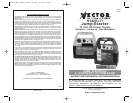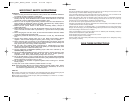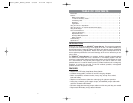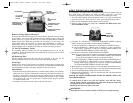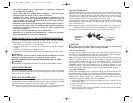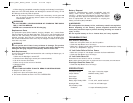
iii
CAUTIONS
Use only the supplied cords/adapters for recharging this unit. Do not recharge for more than 3-4 hours
maximum using 12 volt DC method. Recharge unit after each use.
All on/off switches should be in the OFF position when the unit is charging or not in use. Make sure all
switches are in the OFF position before connection to a power source or load.
Never insert anything other than the supplied power/recharging cords or recommended appliance
power/recharging cords into the 12 volt DC charging/power socket on this unit. Do not use any
accessory that is not recommended or provided by the manufacturer.
Do not use this unit to operate appliances that draw more than 12 amps.
This system is not designed to be used as a replacement for a vehicular battery. Do not attempt to operate
a vehicle that does not have a battery installed.
Although this unit contains a non-spillable battery, it is recommended that it be kept upright during
storage, use and recharging. To avoid possible damage that may shorten the unit’s working life, protect
it from direct sunlight, direct heat and/or moisture.
Check unit periodically for wear and tear. Replace worn or defective parts immediately; contact the
Customer Service Department at (866) 584-5504.
Never submerge this unit in water, or expose it to rain or snow.
Never attempt to jump-start a frozen battery.
All wires, cables, and cords must be positioned so they cannot be tripped over or damaged by moving
parts, pinching or abrading.
SAVE THESE INSTRUCTIONS
ii
IMPORTANT SAFETY INSTRUCTIONS
WARNINGS
1. When working with lead acid batteries, always make sure immediate assistance
is available in case of accident or emergency.
2. Always use protective clothing and eyewear when using this product, contact with
battery acid may cause blindness and/or severe burns. Be aware of first aid
procedures in case of accidental contact with battery acid.
3. There is a risk of explosive gases being released when lead acid batteries are
being charged or discharged. Failure to follow instructions may cause property
damage, explosive hazard, and/or personal injury.
4. Make sure the power switch is OFF before connecting battery clamps to
discharged battery.
5. When charging unit from a 120 volt AC electrical outlet in any wet or damp area,
make sure that the outlet used is protected by a ground fault interrupt (GFCI)
outlet.
6. When charging the unit near water, do not allow the electrical cords and outlets
to get wet; electrical shock could result.
7. Jump-start procedures should only be performed in a safe, dry, well-ventilated
area.
8. Always store battery clamps when not in use. Never touch battery clamps
together – this can cause dangerous sparks, power arcing, and/or explosion.
9. When using this unit in proximity to the vehicle’s battery and engine, stand the
unit on a flat, stable surface, and be sure to keep all clamps, cords, clothing and
body parts away from moving vehicle components.
10. Do not wear vinyl clothing when jump-starting a vehicle-friction can cause
dangerous static electricity sparks. Remove all jewelry or metal objects that could
cause short circuits or react with battery acid.
11. Always disconnect the NEGATIVE (BLACK) jumper cable first: followed by the
POSITIVE (RED) jumper cable.
12. Never allow RED and BLACK clamps to touch each other or another common metal
conductor – this could cause damage to the unit and/or create sparking/
explosion hazard. Always store battery clamps when not in use.
13. Do not expose battery to fire or intense heat as it may explode. Before disposing
of the battery, protect exposed terminals with heavy-duty electrical tape to prevent
shorting (shorting can result in injury or fire).
14. Do not smoke, use matches or cigarette lighters while working on a vehicle’s
battery system.
15. Keep unit out of reach of children (whether stored or in use).
Note: Read this User’s Manual and product labeling carefully before using. Follow
all recommended warnings, cautions and safety procedures; as well as
manufacturer’s guidelines for your vehicle battery.
FIRST AID
Skin: If battery acid comes in contact with skin, rinse immediately with water, then wash thoroughly with
soap and water. If redness, pain, or irritation occurs, seek immediate medical attention.
Eyes: If battery acid comes in contact with eyes, flush eyes immediately for a minimum of 15 minutes –
seek immediate medical attention.
Vec011_VW011_Manual_061005 6/16/05 12:12 PM Page ii



